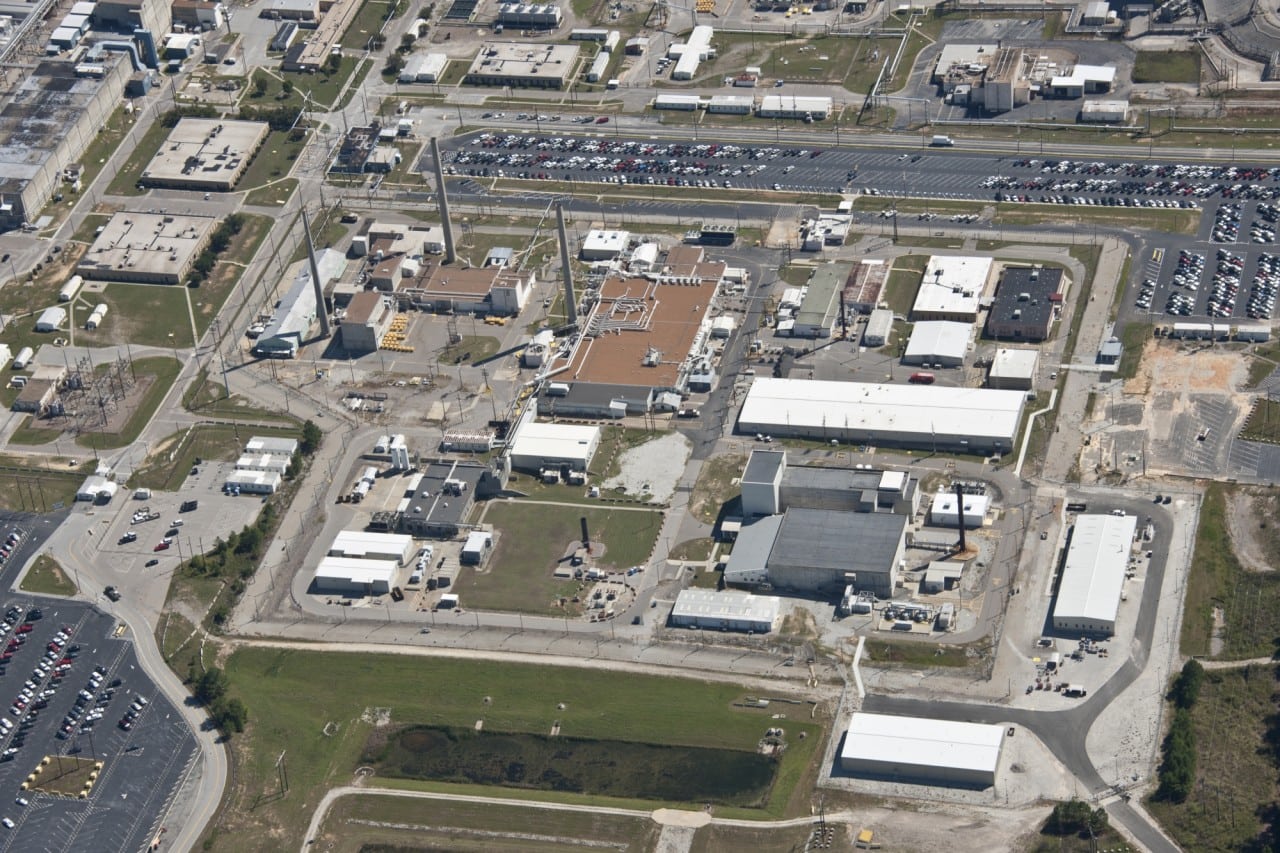
Contractor Parsons’ “degrading performance” while testing and commissioning the Savannah River Site’s $2 billion Salt Waste Processing Facility (SWPF) could push its start of operations back by several months, according to a notice of concern from the Department of Energy.
Rather than the long-anticipated start of operations in December, Parsons’ data suggests SWPF should begin treating waste in March 2019, according to the March 7 notice from Pamela Marks, federal project director for the facility, and Samuel Stewart, a contracting officer with DOE’s Savannah River Operations Office.
The notice says Parsons has severely underperformed in several areas of the contract, including personnel management, safety and regulatory protocol, and properly correcting its errors. Weapons Complex Monitor obtained a copy of the letter, which was addressed to Frank Sheppard, SWPF project manager for Parsons.
Parsons inked a deal with the Energy Department in 2002 to design and build the SWPF, then to provide one year of operations. That contract, valued at about $2 billion, expires on Sept. 30, 2020. The company referred questions on the notice to DOE.
A department spokesperson on Wednesday acknowledged “performance issues that DOE has raised as an internal matter with the contractor,” adding the department “continues to work cooperatively with the contractor to address concerns.”
In an emailed statement, the spokesperson reiterated comments from DOE from earlier this month in which it cited several factors for the delay at SWPF, including the need to replace a part that controls valves at the facility. The department would not answer more detailed questions about the replacement.
Parsons finished construction of the facility in June 2016, about $60 million under budget and eight months ahead of schedule.
The laundry list of issues under Parsons’ leadership began immediately after construction was completed, according to the five-page DOE letter to Parsons. “Since construction completion, Parsons has not maintained adequate control of the SWPF facility and personnel resulting in events and personnel errors adversely impacting project performance,” Marks and Stewart wrote.
For the last decade, SRS has treated close to 7 million gallons of salt waste using a pilot facility operated by site liquid waste contractor Savannah River Remediation (SRR). The Salt Waste Processing Facility is expected to increase waste processing from 1.5 million gallons per year to 6 million. Once the salt waste is separated from other materials, the final product would be placed in storage facilities at SRS for permanent disposal.
When construction of the $2.3 billion facility wrapped up, the Energy Department declared the December 2018 startup date, which was expected to allow enough time for testing and commissioning.
That seemingly has not proven to be the case. Parsons disrupted project performance by making changes to key personnel and other management positions. For example, in October 2017, the contractor dismissed its plant manager without providing an acceptable replacement for DOE approval. That action violated the terms of the company’s contract, according to the notice, and also impeded Parsons’ ability to adequately perform its duties.
Parsons has exhibited poor performance in other areas as well, the department said. In July 2017, the contractor was directed to complete a management self-assessment (MSA) within 30 days to en sure SPWF was ready for cold commissioning – effectively a trial-run phase for the facility. That assessment is expected to conclude this month, which makes it 10 months late. The notice states the delay was caused by “several off-normal events” that eventually resulted in a pause in testing and commissioning work in September 2017.
The notice does not provide details on the events, but says they “impacted progress by several months.”
“This protracted performance also demonstrates Parsons was not prepared to perform this phase of the project and prematurely initiated this MSA,” according to the DOE officials. “This manner of performance has contributed to ineffective use of resources and additional delays.”
Due to these and other issues, the baseline schedule approved in August 2016 can no longer be used.
The Energy Department on Wednesday would not provide the original project baseline for SWPF. In the notice, the Savannah River office said Parsons has failed to change the project baseline, and DOE has lost faith in the company’s ability to forecast completion dates for testing and commissioning and costs of completion.
The SWPF Project Office at Savannah River tried to get Parsons to remedy the issue by developing a plan that included a “resource-loaded schedule.” The plan was to be submitted within 15 days of Oct. 5, 2017, but reached DOE on Dec. 11.
Parsons has come up short in several other areas, according to the notice of concern. These include: failure to implement an effective fire control program; bringing hazardous chemicals to the facility without first providing hazardous materials training for employees; mismanagement of safety showers and eyewash stations; and a severe lack of emergency preparedness readiness.
Despite all of these issues – and Parsons’ data that projects a March 2019 startup – the Energy Department still expects Parsons to meet the December 2018 startup goal, Marks and Stewart wrote in the notice. It instructed the company to take immediate actions to resolve the performance, operation, and safety issues. Specifically, Parsons has been told to establish a “credible and realistic baseline” for SWPF, have a senior official to press activity managers, and properly manage critical path activities.
By April 7, Parsons was supposed to submit a “return to green” recovery plan, detailing how the approved baseline would be achieved. “Failure to do so will jeopardize the successful contract performance and necessitate more formal contractual remedies on behalf of the government and the tax payers,” Marks and Stewart wrote.
The department would not offer any more details on what “contractual remedies” would be implemented. Neither Parsons nor the Energy Department would verify if the plan has been submitted, but the DOE spokesperson said the agency is “currently evaluating information from the contractor to determine potential impacts to cost and schedule.”